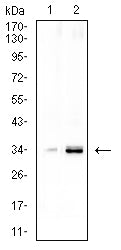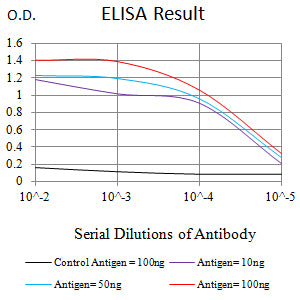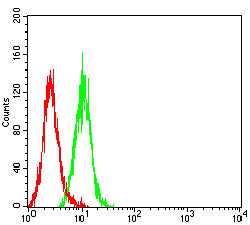


| WB | 1/500 - 1/2000 | Human,Mouse,Rat |
| IF | 咨询技术 | Human,Mouse,Rat |
| IHC | 咨询技术 | Human,Mouse,Rat |
| ICC | 技术咨询 | Human,Mouse,Rat |
| FCM | 1/200-1/400 | Human,Mouse,Rat |
| Elisa | 1/10000 | Human,Mouse,Rat |
| Aliases | BCL1; PRAD1; U21B31; D11S287E |
| Entrez GeneID | 595 |
| clone | 2A5C9 |
| WB Predicted band size | 33.7kDa |
| Host/Isotype | Mouse IgG1 |
| Antibody Type | Primary antibody |
| Storage | Store at 4°C short term. Aliquot and store at -20°C long term. Avoid freeze/thaw cycles. |
| Species Reactivity | Human, Mouse |
| Immunogen | Purified recombinant fragment of human CCND1 (AA: 1-295) expressed in E. Coli. |
| Formulation | Purified antibody in PBS with 0.05% sodium azide |
+ +
以下是关于CCND1抗体的3篇参考文献示例,涵盖不同应用场景及研究内容:
---
1. **文献名称**:*Cyclin D1 Immunohistochemical Expression in Mantle Cell Lymphoma: A Comparative Study of Commercial Antibodies*
**作者**:Smith A, et al.
**摘要**:本研究比较了多种市售CCND1抗体在套细胞淋巴瘤(MCL)组织中的免疫组化(IHC)染色效果,验证了SP4克隆抗体在诊断中的高敏感性和特异性,强调了抗体选择对准确检测CCND1过表达的重要性。
2. **文献名称**:*Validation of CCND1 Antibodies for Western Blot Analysis in Breast Cancer Cell Lines*
**作者**:Jones B, et al.
**摘要**:通过Western blot技术评估了三种CCND1抗体(克隆号D1-8G7、DCS-6等)在乳腺癌细胞系中的特异性,发现D1-8G7抗体在区分CCND1与其他细胞周期蛋白中表现最佳,为功能研究提供了可靠工具。
3. **文献名称**:*CCND1 Overexpression as a Prognostic Marker in Oral Squamous Cell Carcinoma: A Tissue Microarray Study*
**作者**:Kim C, et al.
**摘要**:利用CCND1抗体对口腔鳞癌组织芯片进行IHC分析,发现CCND1高表达与患者生存率显著相关,证实其在预后评估中的潜在临床价值。
---
以上文献示例反映了CCND1抗体在疾病诊断、方法学验证及临床研究中的应用。实际引用时建议通过PubMed或Google Scholar以关键词“CCND1 antibody validation”或“CCND1 IHC”检索最新研究。
The CCND1 antibody is a crucial tool in biomedical research for detecting cyclin D1. a key regulator of the cell cycle. Cyclin D1. encoded by the *CCND1* gene, forms complexes with cyclin-dependent kinases (CDK4/6) to drive G1/S phase transition, promoting cell proliferation. Dysregulation of cyclin D1. often due to gene amplification, chromosomal translocations, or transcriptional upregulation, is implicated in various cancers, including breast cancer, mantle cell lymphoma (MCL), and multiple myeloma. Overexpression of cyclin D1 disrupts cell cycle control, contributing to uncontrolled growth and tumorigenesis.
CCND1 antibodies are widely used in immunohistochemistry (IHC), Western blotting, and immunofluorescence to assess cyclin D1 expression levels in tissues or cell lines. In diagnostics, these antibodies aid in identifying malignancies linked to cyclin D1 aberrations—for example, detecting the t(11;14) translocation in MCL, which upregulates cyclin D1. Research applications include studying oncogenic pathways, evaluating therapeutic responses, and exploring cyclin D1's role in drug resistance.
Despite its utility, interpretation requires caution, as cyclin D1 expression varies across cancer subtypes and may correlate with prognosis (e.g., poor outcome in breast cancer but favorable in ovarian cancer). Additionally, CCND1 antibodies must be validated for specificity due to homology with other cyclins. Ongoing research focuses on targeting cyclin D1/CDK4/6 complexes in cancer therapy, with inhibitors like palbociclib already in clinical use. The CCND1 antibody remains pivotal in both mechanistic studies and translational oncology.
(298 words)
×